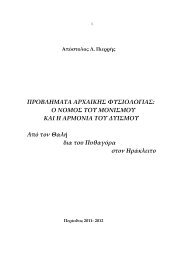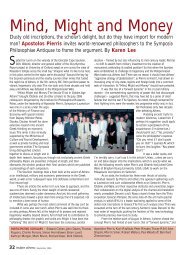APPENDIX C΄ ON DEPILATION: BODY COSMETICS IN CLASSICAL ...
APPENDIX C΄ ON DEPILATION: BODY COSMETICS IN CLASSICAL ...
APPENDIX C΄ ON DEPILATION: BODY COSMETICS IN CLASSICAL ...
You also want an ePaper? Increase the reach of your titles
YUMPU automatically turns print PDFs into web optimized ePapers that Google loves.
574 <strong>APPENDIX</strong> <strong>C΄</strong><br />
in Zenobius V, 10, connected with a story involving Hercules, who<br />
was called ÌÂÏ¿Ìapple˘ÁÔ˜ (St. Gregory Nazianzenus, Oratio III, 78);<br />
and similarly explained by Nonnus Abbas in his scholia to St.<br />
Gregory’s works, ch. 39. MÂÏ¿Ìapple˘ÁÔ˜ was one very hairy in the<br />
buttocks, more particularly in the anal area (Ôî ‰b ‰·Û‡ÙËÙ· appleÂÚd ÙcÓ<br />
apple˘ÁcÓ ÙÔÜ ^HÚ·ÎÏ¤Ô˘˜ etc. Zenobius; …ÙÔÜ ^HÚ·ÎÏ¤Ô˘˜ ÙcÓ apple˘ÁcÓ<br />
̤ϷÈÓ·Ó ı·ۿÌÂÓÔÈ âÎ Ùɘ ÙáÓ ÙÚȯáÓ ‰·Û‡ÙËÙÔ˜, Nonnus). The<br />
meaning of the proverbial expression is succinctly put by Hesychius<br />
s.v. Ì‹ Ù¢ ÌÂÏ. Ù‡¯ÔȘ: Ì‹ ÙÈÓÔ˜ àÓ‰Ú›Ԣ ηd åÛ¯˘ÚÔÜ Ù‡¯ÔȘ.<br />
Gregorius Cyprius, cod. Leidensis II, 73 has the same. I do not notice<br />
the variations between Ù‡¯F˘ and Ù‡¯ÔȘ corresponding to the two; cf.<br />
also Suda s.v. Ìc Û‡ Á ÌÂÏ. Ù‡¯F˘; and s.v. ÌÂÏ¿Ìapple˘ÁÔ˜Ø àÓ‰ÚÂÖÔ˜.<br />
TÔf˜ ÁaÚ ‰·ÛÂÖ˜ Ùa˜ apple˘Á¿˜, àÓ‰Ú›Ԣ˜ âÓfiÌÈ˙ÔÓ. This is the root of<br />
the matter: being hairy and shaggy in the buttocks was considered a<br />
sign of being rough and uncouth, of robustness, of rustic strength, of<br />
rash and impossible manliness, characteristics which befit Hercules<br />
and his rather erratic outbursts and exploits. To intensify the point,<br />
there was another form of the proverb: Ìc ‰·Û˘appleÚÒÎÙˇˆ Û˘ÓÙ‡¯ÔȘ;<br />
thus Macarius V, 82 has MÂÏ·Ìapple‡Áˇˆ Û˘ÓÙ‡¯ÔȘ (pro Û˘ÓÙ‡¯ÔÈ): Ôî<br />
‰¤, ‰·Û˘appleÚÒÎÙˇˆ. The point of this change is illustrated by the form<br />
of the story involving Hercules, as it appears in Apostolius, XI, 19;<br />
Suda s.v. ÌÂÏ·Ìapple‡ÁÔ˘ Ù‡¯ÔȘ; Photius s.v. ÌÂÏ·Ìapple‡ÁÔ˘ Ù‡¯F˘. Now<br />
ÌÂÏ¿Ìapple˘ÁÔÈ are two brothers, two braggarts, who, being extremely<br />
licentious, were warned by their mother, lest they someday get crossed<br />
with a ‰·Û‡appleÚˆÎÙÔ˜ which happened eventually, the ‰·Û‡appleÚˆÎÙÔ˜<br />
being, naturally, Hercules. The point now is that empathic shagginess<br />
in the anal region is sign of greater manly prowess than hairiness of the<br />
buttocks generally; although the focal semantic point of apple˘Á‹ as well<br />
was the anus (cf. apple˘Á›˙ˆ = paedicare).<br />
Now this view of ÌÂÏ¿Ìapple˘ÁÔ˜ or ‰·Û‡appleÚˆÎÙÔ˜ must have been<br />
very ancient: Archilochus utilized it (Fr. 93 Diehl). It is true that the<br />
scholia B (Venetus 453) ad Ilias Ω 915 (from Porphyry), which give us<br />
the Archilochian fragment, consider it to be related to the kind of<br />
eagle which Homer, in loc. refers to: Âúˆı ‰b ηd ï \AÚ¯›ÏÔ¯Ô˜ ÌÂÏ¿-<br />
Ìapple˘ÁÔÓ ÙÔÜÙÔÓ (sc. ÙeÓ àÂÙfiÓ) ηÏÂÖÓØ õ Ù¢ ÌÂÏ.Ù‡¯. And in the<br />
scholia to the above discussed Lycophronian passage (v. 91), we find<br />
incorporated this bit: ÂåÛd ÁaÚ ÌÂÏ¿Ìapple˘ÁÔÈ, apple‡Á·ÚÁÔÈ Âú‰Ë àÂÙáÓ<br />
ηْ \AÚ¯›ÏÔ¯ÔÓØ àÊ Ôy ï ±Úapple·Í apple‡Á·ÚÁÔ˜ (interpreting Lycophron’s










